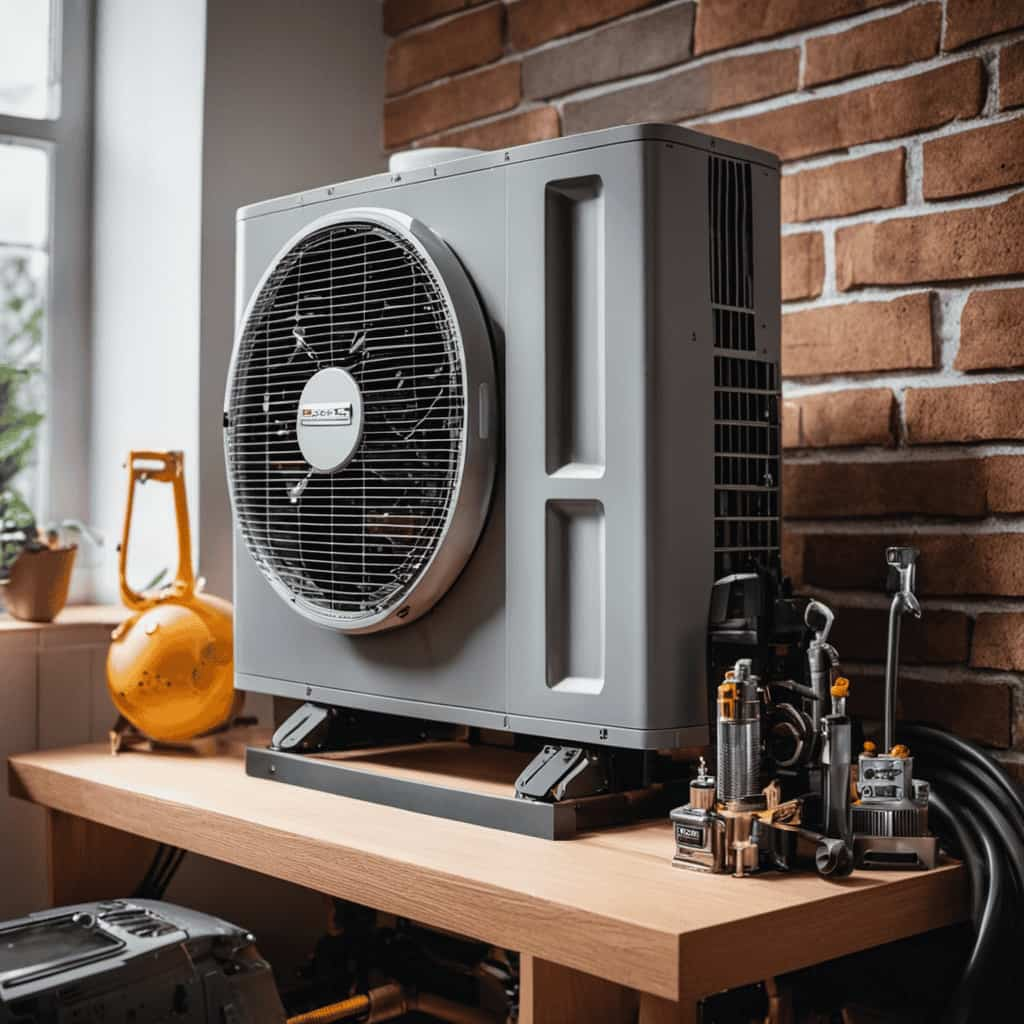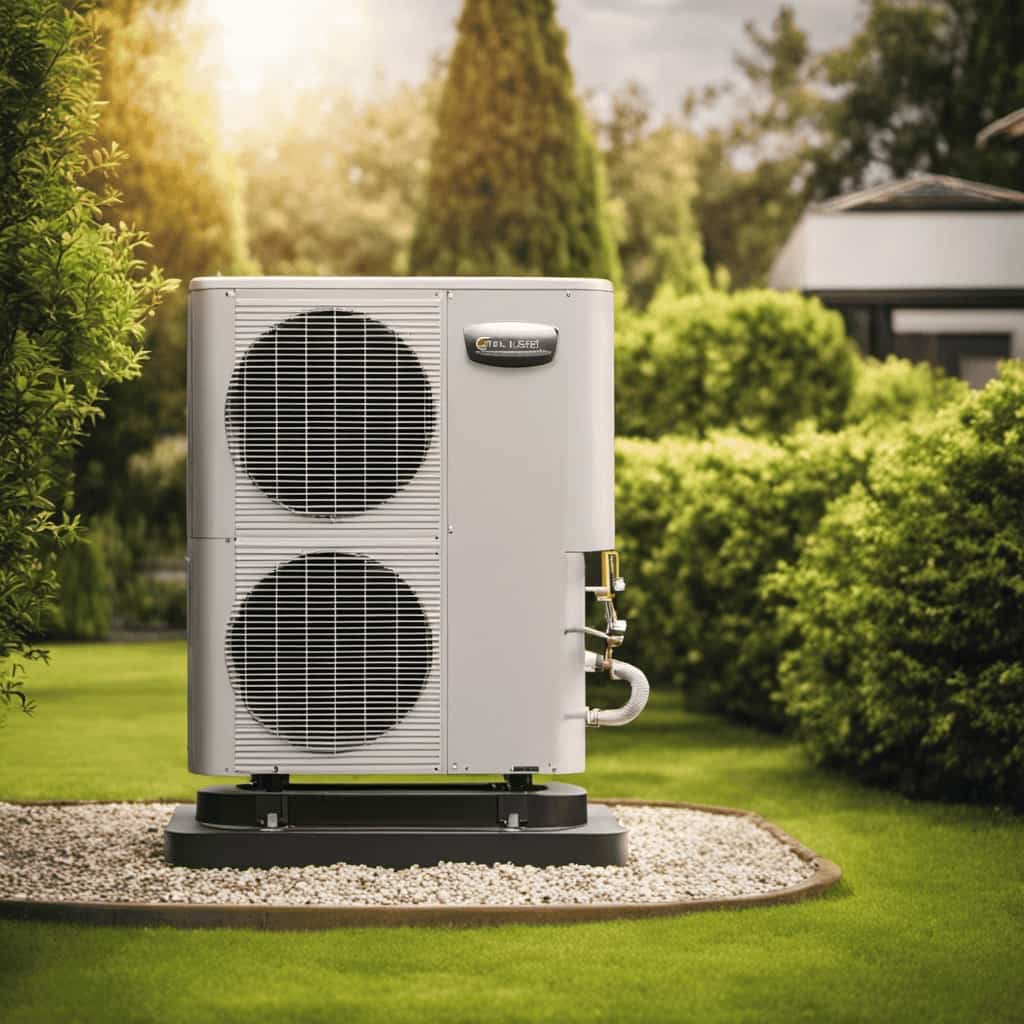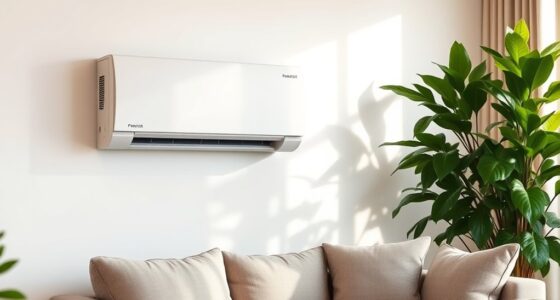Welcome to our beginner’s guide on utilizing heat pumps for climate control. Our goal is to help you comprehend heat pumps more effectively and aid you in making informed decisions.
With our technical expertise and detailed explanations, you’ll understand how heat pumps work, the different types available, and the benefits they offer.
We’ll guide you through the installation process, explain efficiency ratings, troubleshoot common issues, and provide tips for maximizing performance.
Let’s embark on this journey together and create a comfortable and sustainable environment.
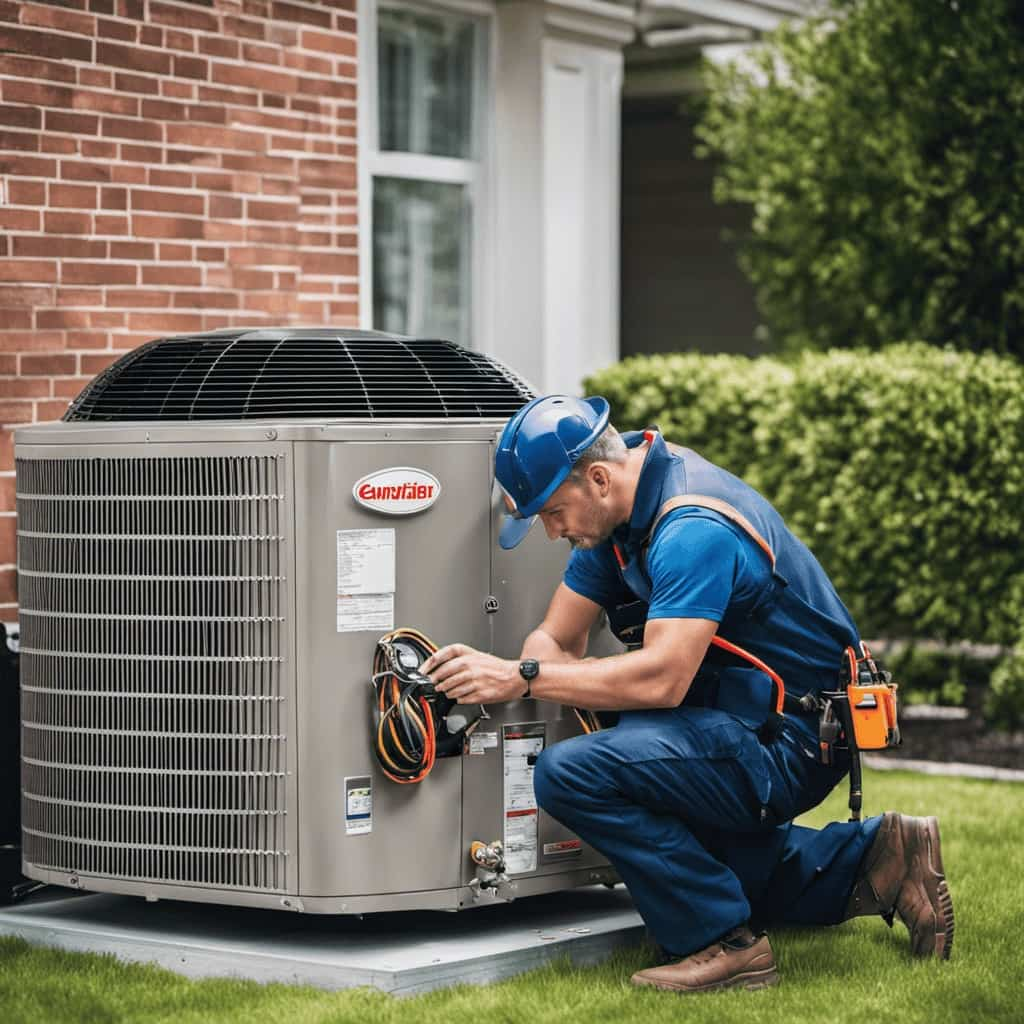
Key Takeaways
- Heat pumps are highly efficient devices for both heating and cooling, extracting heat from the air or ground and transferring it to the desired location.
- Heat pumps offer energy savings and lower utility bills, reducing energy consumption by up to 50% compared to traditional HVAC systems.
- Proper sizing and consideration of the local climate are crucial when choosing a heat pump to ensure optimal performance and energy efficiency.
- Regular maintenance and proper installation are essential for the efficient operation of heat pumps, increasing their lifespan and reducing energy costs.
How Do Heat Pumps Work for Climate Control
We’ll explain how heat pumps work for climate control.
Heat pumps are highly efficient devices that can both heat and cool your home or office. They work by extracting heat from the air or ground and transferring it to the desired location.
One of the advantages of heat pumps for climate control is their energy efficiency. Unlike traditional heating and cooling systems, which generate heat or cool air, heat pumps simply transfer existing heat from one place to another. This means they use less energy and can save you money on your utility bills.
When selecting the right heat pump for climate control, it’s important to consider factors such as the size of your space, the climate in your area, and the desired level of comfort. Consulting with a professional can help ensure you choose the most suitable heat pump for your needs.

Different Types of Heat Pumps for Climate Control
There are several different types of heat pumps for climate control, and each has its own unique features and benefits. Let’s compare them to understand their differences and find the best option for your needs.
The first type is air-source heat pumps, which extract heat from the outdoor air and transfer it inside. They’re easy to install and cost-effective, but their efficiency decreases in extreme temperatures.
Ground-source heat pumps, on the other hand, use the stable temperature of the ground to heat or cool your home. They’re highly efficient but require more installation work and higher upfront costs.
Another type is water-source heat pumps, which extract heat from a water source like a lake or pond. They’re efficient, but the availability of a water source can be a limiting factor.
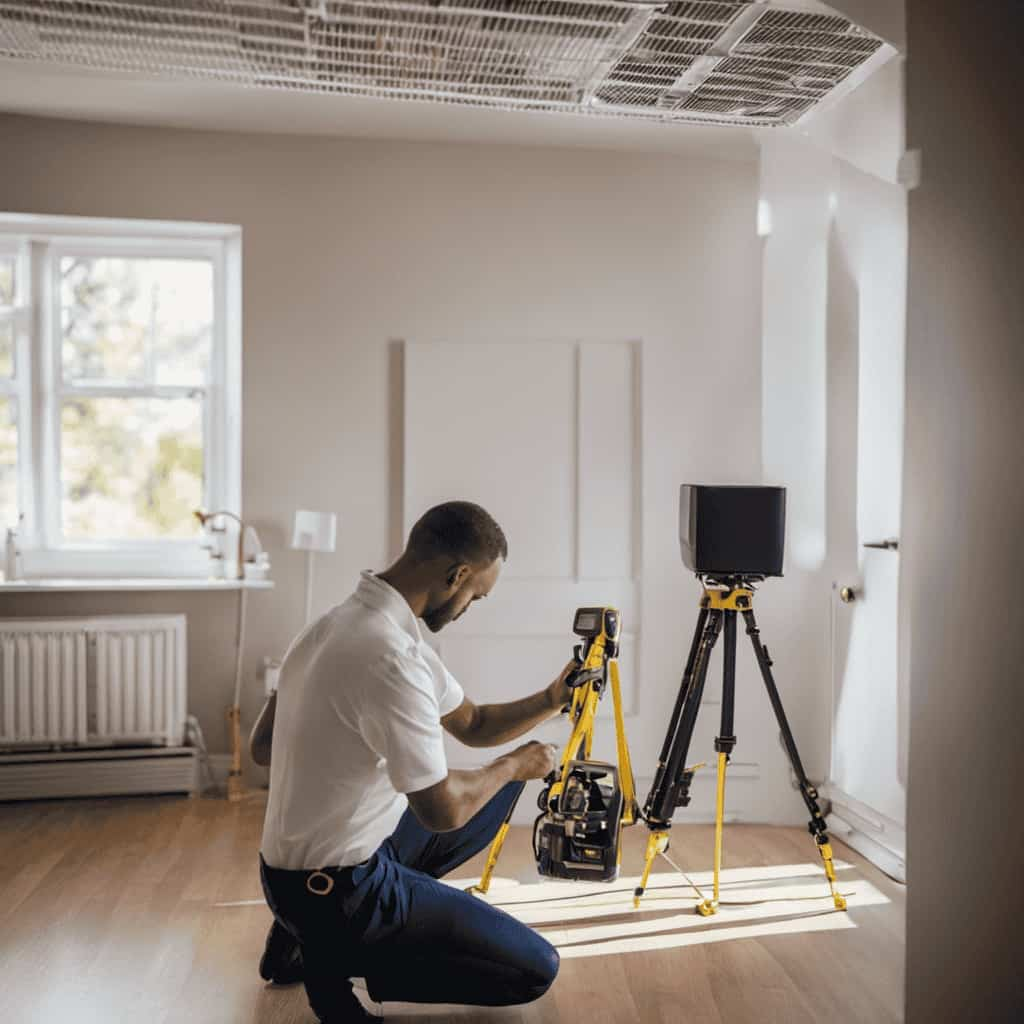
Lastly, there are absorption heat pumps, which use a heat-absorbing fluid instead of a refrigerant. They’re commonly used in commercial applications and have higher operating costs.
Benefits of Using Heat Pumps for Climate Control
Using heat pumps for climate control not only provides efficient heating and cooling, but also helps reduce energy consumption and lower utility bills.
Heat pumps are designed to transfer heat from one place to another, rather than generating heat directly. This makes them more energy-efficient compared to traditional heating and cooling systems.
By utilizing the heat from the air or ground, heat pumps can achieve significant energy savings. In fact, studies have shown that heat pumps can reduce energy consumption by up to 50% compared to conventional HVAC systems.

Additionally, heat pumps have a lower environmental impact as they produce fewer greenhouse gas emissions. This makes them a more sustainable choice for climate control, aligning with the goal of reducing our carbon footprint and protecting the environment.
Factors to Consider When Choosing a Heat Pump for Climate Control
When considering a heat pump for climate control, it’s important to take into account factors such as energy efficiency and size requirements.
Choosing the right heat pump can significantly impact the energy consumption and overall comfort of your space. To make an informed decision, it’s essential to consider the following factors:
Energy Efficiency Ratings: Look for heat pumps with high Seasonal Energy Efficiency Ratio (SEER) and Heating Seasonal Performance Factor (HSPF) ratings. Higher ratings indicate better energy efficiency and lower operating costs.

Size Requirements: Ensure that the heat pump is appropriately sized for your space. A heat pump that’s too small may struggle to maintain the desired temperature, while one that’s too large may cycle on and off frequently, leading to increased energy consumption and reduced comfort.
Climate Considerations: Consider your local climate when choosing a heat pump. Different models are designed to perform optimally in specific temperature ranges. Selecting a heat pump that’s suitable for your climate will ensure efficient operation and maximum comfort.
Taking these factors into account will help you choose the right heat pump for your climate control needs, optimizing energy efficiency and providing a comfortable environment.
Installation Process of Heat Pumps for Climate Control
We will now discuss the step-by-step installation process for heat pumps in order to provide a clear understanding of how to properly set up climate control systems.

When it comes to installing heat pumps for climate control, there are several important installation considerations to keep in mind. First, it’s crucial to select the right location for the heat pump, taking into account factors such as accessibility, noise level, and clearance requirements.
Additionally, proper sizing and placement of the heat pump is essential for optimal performance and energy efficiency. Best practices for heat pump installation include ensuring proper insulation, sealing ductwork, and following manufacturer guidelines for electrical connections.
Lastly, it’s important to test the system thoroughly before finalizing the installation to ensure that all components are working correctly.
Proper Maintenance for Heat Pumps in Climate Control Systems
Regular maintenance is essential for ensuring the optimal performance and longevity of heat pumps in climate control systems. By performing common maintenance tasks such as cleaning the filters, checking for refrigerant leaks, and inspecting the electrical connections, we can prevent potential issues and keep the heat pump running efficiently.

Proper maintenance also offers benefits like improved energy efficiency, reduced energy costs, and a more comfortable indoor environment.
Importance of Regular Maintenance
To ensure optimal performance, it’s crucial that we regularly maintain our heat pumps in climate control systems. Regular maintenance offers numerous benefits, such as increasing the lifespan of the heat pump, improving energy efficiency, and reducing the risk of breakdowns. By performing preventative maintenance, we can identify and address any minor issues before they escalate into major problems, saving us time and money in the long run.
Here are some preventative maintenance tips to keep our heat pumps running smoothly.
First, we should clean or replace the air filters regularly to ensure proper airflow and prevent dust and dirt buildup.

Secondly, we should inspect and clean the outdoor unit to remove any debris that may obstruct the airflow.
Thirdly, we should check the refrigerant levels and ensure they’re at the correct level.
Lastly, we should schedule professional maintenance inspections at least once a year to detect any potential issues and ensure the system is operating at its best.
Common Maintenance Tasks
While performing regular maintenance on our heat pumps in climate control systems, it’s important to be aware of common maintenance tasks to ensure optimal performance. Here are three common maintenance tasks and troubleshooting techniques to keep in mind:

Cleaning the filters: Regularly cleaning or replacing the filters is essential to maintain good airflow and prevent dust and debris from accumulating. Clogged filters can reduce the efficiency of the heat pump and compromise indoor air quality.
Checking the refrigerant levels: Low refrigerant levels can indicate a leak or other issues. It’s crucial to monitor and maintain the correct refrigerant levels to ensure the heat pump operates efficiently and effectively.
Inspecting and cleaning the outdoor unit: The outdoor unit can accumulate dirt, leaves, and debris, which can obstruct airflow and hinder the heat pump’s performance. Regularly inspecting and cleaning the outdoor unit helps maintain optimal airflow and prevents potential damage.
Benefits of Proper Maintenance
By properly maintaining our heat pumps in climate control systems, we can maximize their efficiency and ensure optimal performance. Regular maintenance offers several benefits that contribute to the cost-effectiveness of these systems. Firstly, it helps to identify and address any minor issues before they escalate into major problems, saving us from expensive repairs or replacements. Secondly, proper maintenance ensures that our heat pumps operate at their peak efficiency, reducing energy consumption and lowering utility bills. Additionally, regular servicing extends the lifespan of the equipment, minimizing the need for premature replacements. To highlight the benefits of regular maintenance, consider the following table:

| Benefits of Regular Maintenance |
|---|
| Early problem detection |
| Improved energy efficiency |
| Prolonged equipment lifespan |
| Cost savings on repairs |
Energy Efficiency and Cost Savings With Heat Pumps for Climate Control
Using heat pumps for climate control can lead to significant energy efficiency and cost savings. Here are three key ways heat pumps can help you save energy and reduce costs:
Reduced energy consumption: Heat pumps are more energy-efficient than traditional heating and cooling systems. They work by transferring heat from one place to another, rather than generating heat from a fuel source. This means they use less energy to maintain a comfortable indoor temperature, resulting in lower energy bills.
Lower environmental impact: Heat pumps produce fewer greenhouse gas emissions compared to conventional heating and cooling systems. By using renewable energy sources like air, water, or ground heat, heat pumps can help reduce your carbon footprint and contribute to a cleaner, greener environment.
Long-term cost savings: Although heat pumps may have a higher upfront cost compared to conventional systems, their energy savings over time can offset this initial investment. With proper maintenance and regular servicing, heat pumps can provide reliable and efficient climate control for many years, resulting in long-term cost savings.

Understanding Heat Pump Efficiency Ratings for Climate Control
When it comes to heat pump efficiency ratings for climate control, understanding their importance is crucial.
These ratings provide valuable information about the energy efficiency of the heat pump system, helping homeowners make informed decisions.
Choosing the right rating is essential to ensure optimal performance and cost savings in the long run.
Importance of Efficiency Ratings
Understanding heat pump efficiency ratings is crucial for achieving effective climate control. Efficiency ratings measure the amount of energy a heat pump consumes and how effectively it converts that energy into heating or cooling output. Here are three reasons why efficiency ratings are important:
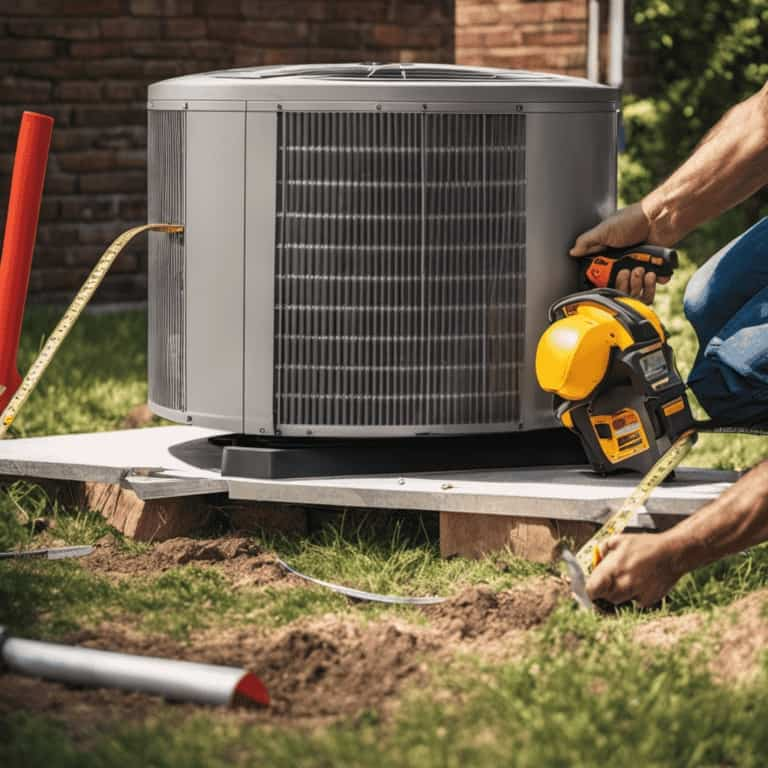
Energy savings: Heat pumps with higher efficiency ratings consume less energy, resulting in lower utility bills. By choosing a heat pump with a higher SEER (Seasonal Energy Efficiency Ratio) or HSPF (Heating Seasonal Performance Factor) rating, homeowners can save significant amounts of money on their energy costs.
Environmental impact: Heat pumps with higher efficiency ratings also have a smaller environmental footprint. They produce fewer greenhouse gas emissions, helping to reduce air pollution and combat climate change. By investing in an energy-efficient heat pump, homeowners can contribute to a more sustainable and eco-friendly future.
Long-term cost savings: While energy-efficient heat pumps may have a higher upfront cost, they can provide long-term savings through reduced energy consumption. The energy savings over the lifespan of the heat pump can offset the initial investment, making it a financially wise choice in the long run.
Choosing the Right Rating
To ensure optimal climate control, we must consider the efficiency ratings when choosing the right heat pump rating.

Heat pump efficiency refers to the ratio of heat output to the energy input required to produce that heat. It’s typically expressed as a coefficient of performance (COP) or an energy efficiency ratio (EER). The higher the efficiency rating, the more energy-efficient the heat pump is, meaning it can provide more heat output with less energy consumption.
On the other hand, heat pump capacity refers to the amount of heat that a heat pump can produce or remove in a given period. It’s important to choose a heat pump with the right capacity for your climate control needs to ensure adequate heating or cooling.
Now that we understand the importance of efficiency ratings and capacity, let’s dive into the common issues and troubleshooting for heat pumps in climate control.
Common Issues and Troubleshooting for Heat Pumps in Climate Control
We often encounter problems with heat pumps in climate control, but with some troubleshooting, we can resolve these issues. Here are three common malfunctions and their corresponding troubleshooting techniques:

- Insufficient heating or cooling:
- Check if the thermostat is set correctly and adjust it if needed.
- Ensure that the heat pump is receiving power and that the circuit breaker isn’t tripped.
- Clean or replace the air filters if they’re dirty or clogged, as this can restrict airflow.
- Heat pump not turning on:
- Confirm that the unit is receiving power and that the thermostat is properly set.
- Examine the circuit breaker and reset it if necessary.
- Check the wiring connections to ensure they’re secure and not damaged.
- If the issue persists, contact a professional technician for further assistance.
- Strange noises or vibrations:
- Inspect the heat pump for loose or damaged parts.
- Tighten any loose screws or bolts and replace any worn-out components.
- Clean the heat pump to remove any debris that may be causing the noise.
- If the problem persists, consult a professional technician to avoid further damage.
By troubleshooting these common issues, we can ensure the efficient operation of heat pumps in climate control systems.
In the next section, we’ll explore the integration of heat pumps with other climate control systems.
Integrating Heat Pumps With Other Climate Control Systems
When integrating heat pumps with other climate control systems, we can achieve optimal efficiency and comfort. One exciting development in this area is the integration of heat pumps with smart home technology. By connecting heat pumps to a smart home system, homeowners can remotely control and monitor their heat pumps, adjusting settings and scheduling operation times from their smartphones or other devices. This not only enhances convenience but also allows for more precise temperature control and energy management.
Additionally, the future of heat pump technology for climate control holds great promise. Advancements in heat pump technology, such as the use of refrigerants with lower global warming potential and improved compressor design, will further enhance efficiency and environmental sustainability. Integrating heat pumps with smart home technology and embracing future advancements will undoubtedly bring about more efficient and comfortable climate control solutions.

Tips for Maximizing the Performance of Heat Pumps in Climate Control
How can we optimize the performance of our heat pumps in climate control?
Here are three troubleshooting tips to maximize efficiency:
Regular Maintenance: Schedule regular inspections and maintenance for your heat pumps to ensure they’re operating at peak performance. This includes cleaning or replacing air filters, checking refrigerant levels, and inspecting electrical connections. Regular maintenance helps prevent issues and ensures efficient operation.
Proper Insulation: Ensure your home is properly insulated to minimize heat loss or gain. Poor insulation can cause the heat pump to work harder, leading to decreased efficiency. Insulate walls, floors, and ceilings, and seal any air leaks. This will help the heat pump maintain the desired temperature more efficiently.

Thermostat Settings: Optimize your thermostat settings to maximize efficiency. Set the temperature to the desired level and avoid unnecessary adjustments. Additionally, consider using programmable thermostats to automatically adjust temperatures based on your schedule. This helps minimize energy consumption and maximize the performance of your heat pump.
Frequently Asked Questions
Can Heat Pumps Be Used for Both Heating and Cooling Purposes?
Yes, heat pumps can be used for both heating and cooling purposes. They are efficient in terms of heating and cooling, and when compared to traditional HVAC systems, they can provide cost savings.
Are Heat Pumps Suitable for All Climates?
Heat pumps are generally suitable for all climates, but their efficiency may vary depending on temperature extremes. Regular heat pump maintenance is crucial to ensure optimal performance and energy savings.
How Long Do Heat Pumps Typically Last?
Heat pumps typically last 10-15 years with proper heat pump maintenance. Signs of heat pump failure include reduced heating or cooling capacity, unusual noises, and frequent breakdowns. Regular maintenance can extend the lifespan.

Can Heat Pumps Be Installed in Existing Homes or Only in New Constructions?
Yes, heat pumps can be installed in existing homes. However, it is important to consider the installation requirements and energy efficiency of the system to ensure optimal performance and cost savings.
What Are the Potential Drawbacks or Limitations of Using Heat Pumps for Climate Control?
When considering heat pumps for climate control, it’s important to be aware of potential drawbacks or limitations. Some examples include lower energy efficiency in extremely cold climates and higher upfront costs compared to traditional heating systems.
Can Heat Pumps Provide Affordable Climate Regulation?
Heat pumps are a viable option for affordable climate regulation. These efficient systems utilize renewable energy sources to transfer heat from one area to another, keeping spaces cool in summer and warm in winter. Investing in affordable heat pumps for climate regulation not only helps protect the environment but also reduces energy costs, making it a smart choice for homeowners and businesses alike.
What Are the Basics of Heat Pumps for Climate Control?
When it comes to mastering home comfort with heat pumps, understanding the basics is crucial. Heat pumps are an energy-efficient heating and cooling solution that can effectively control climate. They work by transferring heat from the outside to the inside during winter and vice versa in summer. With their ability to provide year-round comfort, heat pumps have become a popular choice for homeowners looking for efficient climate control solutions.
Conclusion
In conclusion, heat pumps offer an efficient and effective solution for climate control. With their ability to both heat and cool, different types of heat pumps can cater to various needs. Their benefits, such as energy savings and easy installation, make them a popular choice.
However, it’s important to consider factors like size and efficiency ratings when selecting a heat pump. By maximizing their performance and integrating them with other climate control systems, heat pumps can provide optimal comfort for any space.
